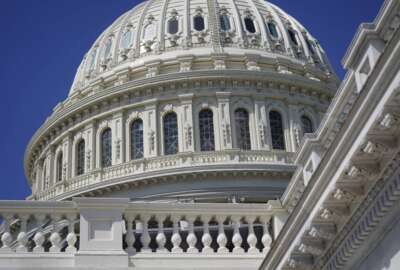
NARA projects eliminating veterans records backlog by December
The National Archives has a plan to eliminate the pandemic-era backlog and avoid similar situations in the future.
The National Archives and Records Administration plans to eliminate by December a backlog of military service records requests that has delayed many veterans in accessing federal benefits.
In a new plan issued Feb. 24, NARA laid out its projected timeline for eliminating the pandemic-era backlog, as well as its strategy to avoid similar scenarios in the future. The plan was required under the Access for Veterans to Records Act, passed as part of the Fiscal 2023 National Defense Authorization Act.
The NDAA also authorized $60 million for NARA to help eliminate the backlog at the National Personnel Records Center in St. Louis, Mo. The cases piled up during the pandemic, when on-site staffing limits prevented employees from accessing hard copy records at the center.
The NPRC had approximately 408,000 unanswered requests for military service records as of late February, a 33% reduction from the peak of 604,000 cases in March 2022, according to the Archives plan.
The backlog of overdue requests, which haven’t had a response in more than 20 days, sits at approximately 338,000 cases.
NARA also notes that the backlog of overdue requests for military separation records — DD Form 214 requests — has been eliminated and returned to a pre-pandemic rate of servicing 90% of such requests within 20 days. Requests for separation records represent about 60% of all requests received by the NPRC.
The remainder of the backlog represent the most “complex cases,” NARA’s plan states.
“Nevertheless, we are committed to eliminating the backlog and restoring pre-pandemic response times as soon as possible,” it continues. “NARA has already expanded off-site operations, made significant investments in information technology, and substantially increased the workforce to maximize production and address the backlog.”
The agency projects that it will cut the current backlog of overdue requests in half to approximately 169,000 cases by September, with it being completely eliminated by Dec. 2, according to the plan.
Meanwhile, the Biden administration’s nominee for Archivist of the United States wants to see if the backlog can be reduced faster.
Appearing before the Senate Homeland Security and Governmental Affairs Committee on Tuesday, Colleen Shogan said if she is confirmed, her first trip as Archivist will be to the NPRC “to see the operations on the ground, to figure out where we can find efficiencies, to make sure that we are using contractual authorities to the highest extent to make sure that work gets done in an expeditious fashion.”
“And also to explore any other creative solutions where we might be able to move that deadline up,” she added. “Although ambitious, December 2023, I think we could all agree we’d like to have that sooner if possible.”
NARA eyes digitization, case management upgrades
NARA’s plans for eliminating the backlog and avoiding them in the future relies on digitizing records and moving to a more modern case management technologies.
NARA notes it’s already working with the Department of Veterans Affairs to digitize veterans’ records, with the VA taking advantage of funding from the American Rescue Plan to accelerate that work.
The Archives is also spending $600,000 in fiscal 2023 to transfer and maintain digitized records from the VA.
“Digitized records are maintained in NARA’s cloud workspace where NARA staff can access VA images files and conduct day-to-day processing of veteran requests,” the plan states.
NARA has also received $9 million from the Technology Modernization Fund to modernize the Case Management Reporting System it uses to process records requests, including for military service documents. The Archives is allocating $7.1 million for the project in fiscal 2023 to modernize the system, including development costs and the configuration of a Cloud Access Secure Broker, according to the plan.
The Archives also plans to authenticate public users on the case management system using the General Services Administration’s Login.gov offering.
NARA is also funding electronic processing upgrades for the system this year, including “eVetRecs,” an online portal that veterans can use to submit requests, the plan notes.
In fiscal 2024, the Archives plans to allocate funding to upgrade its technology infrastructure to support the increase in digitized records and the need to allow staff to process requests remotely. NARA also plans to increase funding to “deploy virtual servers, increase cloud-storage, expand bandwidth, support remote access, data center upgrades, and replace end-of-life hardware to improve operations at the NPRC.”
The ongoing shift to a modern technology infrastructure, digitized records, and remote work are all crucial facets of the plan to avoid future backlogs at the NRPC.
“The investments made in remote work have substantially improved NARA’s mission resilience,” the NARA plan states. “Our remote work functionality allows our staff to work from home in conditions that would otherwise stop production. For example, in a recent weather emergency, NPRC staff responded to more than 4,000 requests while working remotely, whereas prior to the pandemic the center would have closed for the entire day and output would have been zero.”
Copyright © 2025 Federal News Network. All rights reserved. This website is not intended for users located within the European Economic Area.
Follow @jdoubledayWFED





